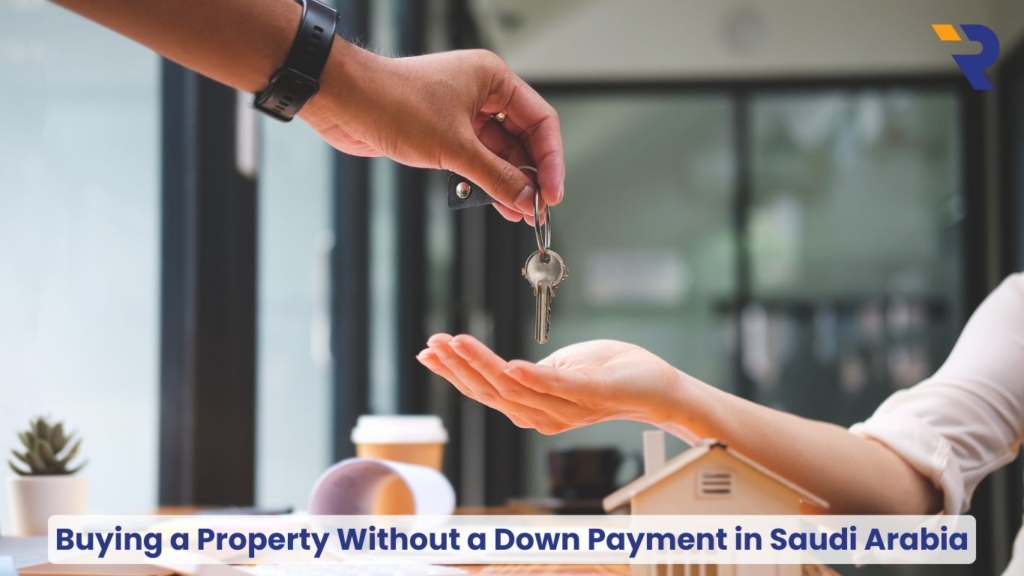Understanding the Concept of Buying Property Without a Down Payment
Buying property without a down payment in Saudi Arabia might sound too good to be true — and for most people, it is. But let’s take a step back and understand what a “down payment” really means in the Saudi context and why it’s such a significant barrier for many first-time buyers.
A down payment is the initial lump sum you pay upfront when buying a property. In Saudi Arabia, banks typically expect buyers to pay 10% to 30% of the property value as a down payment before approving a mortgage. This initial payment acts as a safety net for lenders and shows that you, the buyer, are financially committed and capable of carrying a mortgage.
Globally, similar expectations exist. In the U.S., for example, 20% is the norm, while in countries like the UAE, it can go up to 25% or more. So Saudi Arabia falls in line with international practices, but the challenge here is compounded by unique economic and cultural factors — such as high living expenses in cities like Riyadh and Jeddah, the pressure of early family responsibilities, and limited access to long-term savings strategies.
But why would someone want to skip the down payment?
Let’s say Fatima and Omar, a young married couple living in Jeddah, find their dream apartment in the city. It’s priced at SAR 800,000. Even a 15% down payment would mean SAR 120,000 — a huge sum to save, especially with daily living expenses, family obligations, car payments, and rent. Despite being well-educated and employed, the couple is faced with a dilemma: delay buying or borrow more.
For people like Fatima and Omar, no down payment home financing in Saudi becomes a tempting idea. But is it realistic? That’s what we’ll explore next — including all the fine print, the risks, and the real solutions that work.
⚠ Real Talk: Skipping a down payment means borrowing more — which leads to higher monthly payments, more interest paid over time, and sometimes, a tougher loan approval process. You may also be stretching your financial limits. So while avoiding a down payment may feel like relief today, it could cost significantly more tomorrow — both financially and emotionally.
Can You Buy a Property Without a Down Payment in Saudi Arabia?
Let’s answer this upfront: Technically, no — you can’t buy a property in Saudi Arabia without some form of upfront payment. But there are creative ways to reduce or cover that payment through programs, planning, or layered financing.
✅ What the Law Says:
Saudi banks and financial institutions operate under regulations set by the Saudi Central Bank (SAMA) and guidelines from the Real Estate Development Fund (REDF) and Ministry of Housing. These regulations require:
- A minimum 10% down payment for first-time homebuyers
- Proof of stable income (salary, self-employment, or business)
- Positive credit history and a solid SIMAH score
Even government-supported mortgages — like those offered via REDF — require a contribution, though they sometimes subsidize a large portion of it.
🧠 Myth-Busting Callout Box:
“Can I really skip the down payment in KSA? Not exactly — here’s why.”
- Zero down offers are often marketing language, not actual financial structures
- Some sellers inflate the price to “cover” your down payment, which increases your loan size and risk
- Others bundle the down payment into your mortgage — but at a much higher interest rate
So while buying property without down payment in Saudi Arabia is a common goal, the truth is more nuanced and requires careful navigation.
The good news? There are options to make the down payment easier — or even indirectly covered — if you understand your eligibility and plan smartly. Let’s explore them next.
Methods to Secure the Required Down Payment for Property in Saudi Arabia
If paying a lump sum upfront feels impossible, you’re not alone. Many aspiring homeowners feel exactly the same way. Here are four legitimate, widely used methods to handle or reduce your down payment burden in Saudi Arabia:
✅ Government-Supported Programs
Saudi Arabia has made substantial investments in supporting home ownership, especially for first-time buyers, newlyweds, and middle-income families.
- REDF (Real Estate Development Fund Saudi): Offers subsidized loans, down payment assistance, and long-term financing support. Some packages cover 100% of the home’s cost, especially for eligible citizens under the age of 40.
- Sakani Program (Ministry of Housing): Offers access to pre-approved housing units, mortgage subsidies, and even direct financial support for down payments.
Who Qualifies?
- Saudi citizens with national ID
- Minimum monthly income (varies by program)
- Registration via the Sakani portal or REDF official website
- Often prioritized for newly married couples, government employees, or large families
These are often the most affordable and secure methods of reducing or eliminating your down payment in Saudi Arabia.
✅ Traditional Mortgage Loans
Most major Saudi banks — like Al Rajhi Bank, Banque Saudi Fransi, and NCB — offer mortgage options that cover up to 90% of the property’s value, leaving you responsible for the 10% down payment.
- Requires official salary slips or income proof
- Ideal for those with consistent employment in government or large corporations
- Often paired with REDF if you qualify
- Repayment periods range from 10 to 30 years
This is the most common path for salaried professionals looking for a property loan without initial payment Saudi support — especially when paired with subsidized interest rates.
✅ Personal Loans
When other options aren’t available, some buyers opt for a personal loan for down payment in Saudi Arabia to cover the upfront costs.
- Offered by most banks with fast approvals
- Terms typically range from 12 to 60 months
- Can bridge the gap if you’re just short of the required down payment
Use with caution. Because personal loans come with higher interest rates than mortgages, this method can increase your financial burden. However, in urgent cases — like job relocation or family expansion — it’s sometimes the only feasible option.
✅ Savings Plans
If you’re not in a rush, starting a home savings plan could be your most financially responsible choice.
- Create a monthly savings goal (e.g., SAR 2,000–3,000)
- Use high-interest savings accounts or Sharia-compliant investment funds
- Reach your 15% target over 2–3 years
Some employers in Saudi even offer housing savings programs, where part of your salary goes toward a housing fund with matched contributions. This option not only avoids debt but builds strong financial habits for the future.
🔍 At-a-Glance Comparison Table
| Option | Pros | Cons | Ideal For |
|---|---|---|---|
| REDF / Sakani Programs | Low/no interest, government-backed, flexible terms | Eligibility requirements, processing time | First-time Saudi buyers |
| Traditional Mortgage | Long-term, reliable, often REDF-compatible | Requires income proof, some upfront costs | Salaried professionals |
| Personal Loan | Fast funding, flexible, accessible | Higher interest, increases debt load | Urgent buyers with limited savings |
| Home Savings Plan | No interest, builds good habits, debt-free | Time-consuming, requires discipline | Long-term planners, non-urgent buyers |
Tips Before Making a Decision
Here are some real, practical tips that apply whether you’re buying your first apartment, a starter villa, or even an investment property:
- ✅ Know your credit score – Most banks in Saudi check your SIMAH rating before loan approval
- ✅ Compare at least 3 banks – Don’t just go with the first offer; interest rates and terms can vary drastically
- ✅ Talk to a licensed financial advisor – Not just a sales agent, but someone who understands debt-to-income ratios and mortgage structuring
- ✅ Calculate the true cost of ownership – Include government fees, property registration, insurance, maintenance, and any hidden developer costs
- ✅ Stay within your comfort zone – A higher loan might get you a bigger house, but will you sleep well with the payments?
- ✅ Avoid emotional decisions – Whether it’s a sea view or luxury tiles, make sure your purchase aligns with your long-term financial well-being
💬 “Buy smart, not fast. Owning a home should feel like freedom, not pressure.”
These tips are especially important for buyers exploring how to buy a house without down payment KSA — where financing strategies can blur financial judgment. The goal should be sustainable ownership, not just the thrill of buying.
For All Your Real Estate Needs in Saudi Arabia, Consult Real Estate Saudi
At Real Estate Saudi, we believe every buyer deserves clear, honest, and tailored advice. Whether you’re a young couple just starting out, an expat investor, or a growing family, we’ll help you explore all your options.
Here’s how we help:
- ✅ Match you with properties based on your income, family size, and financing capacity — not just listings
- ✅ Guide you through mortgage eligibility, from bank paperwork to REDF submission
- ✅ Spot red flags in contracts, neighborhood zoning, or developer practices
- ✅ Connect you with certified mortgage advisors and legal professionals so you feel confident at every step
We specialize in helping clients navigate no down payment home financing Saudi challenges with honesty and local insight. Whether it’s finding the right loan, planning your savings, or securing government support, our advisors walk the entire journey with you.
🎯 “Looking to buy a home in Saudi Arabia — even without a big savings account? Book your free consultation with Real Estate Saudi and let’s explore your best options together.”
Certain FAQs
Is it legal to buy a home in Saudi Arabia with zero down payment?
While there is no specific law banning zero-down financing, Saudi mortgage regulations (SAMA) require a minimum down payment for most standard loans. Workarounds are usually achieved through government support or layered financing.
Can expatriates buy property in Saudi Arabia without a down payment?
Expatriates can buy property in designated zones with permission, but zero-down options are extremely limited and not covered under REDF or Sakani programs. A down payment is almost always required.
What is the minimum salary required to get a home loan in Saudi Arabia?
Most banks require a minimum monthly income between SAR 4,000 and SAR 8,000 for home loan eligibility. However, the exact amount may vary based on the bank and whether you are salaried or self-employed.
Are there hidden costs when purchasing with no down payment options?
Yes, often these include inflated property pricing, bundled administrative fees, higher interest rates, or mandatory insurance premiums. Always ask for a full cost breakdown before signing any agreement.
How long does it take to get REDF or Sakani down payment support approved?
Approval timelines vary but typically range from 2 to 6 weeks depending on documentation, eligibility verification, and demand. Early registration and complete documentation help speed up the process.





